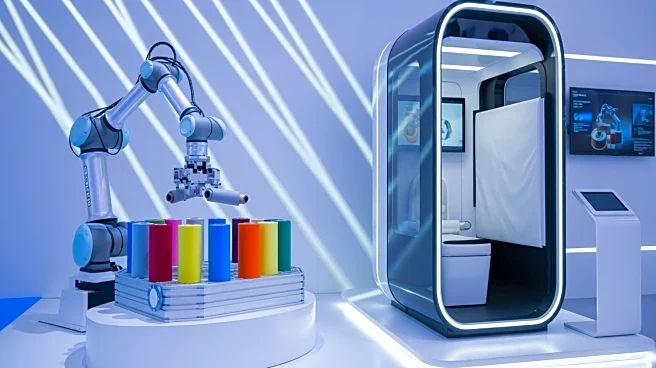What's Happening?
The Department of Industrial Technology (DoIT) of the Ministry of Economic Affairs (MOEA) showcased 65 innovative technologies at the Taiwan Innotech Expo (TIE). These technologies span smart manufacturing,
net zero sustainability, and healthcare. Among the highlights is the AI Clothing Sorting System developed by the Taiwan Textile Research Institute (TTRI), which uses Multi-Spectral Imaging AI Recognition Technology to enhance recycling efficiency. This system can identify materials and compositional ratios in textiles with a 95% recognition rate, processing up to 900 kilograms of waste textiles per hour. Additionally, the Metal Industries Research & Development Centre (MIRDC) introduced new equipment for depression treatment, featuring a Multi-Channel Transcranial Magnetic Stimulation (rTMS) System Technology that simplifies operation and reduces treatment time by up to 70%.
Why It's Important?
The unveiling of these technologies at the Taiwan Innotech Expo signifies Taiwan's commitment to advancing technological innovation across various sectors. The AI Clothing Sorting System addresses environmental concerns by improving recycling efficiency, potentially reducing post-processing costs and enhancing sustainability in the textile industry. The new depression treatment equipment could revolutionize mental health care by providing more efficient and accessible treatment options, thereby strengthening Taiwan's medical self-reliance. These developments highlight Taiwan's strategic focus on integrating AI and advanced technologies to drive economic growth and improve public health outcomes.
What's Next?
The technologies showcased at the expo are expected to undergo further development and integration into practical applications. The AI Clothing Sorting System may see expanded use in the textile industry, potentially influencing global recycling practices. The depression treatment equipment is currently undergoing clinical trials, which could lead to widespread adoption in healthcare facilities, enhancing treatment options for patients. Continued collaboration with industry partners and research institutes will be crucial in advancing these technologies and ensuring their successful implementation.
Beyond the Headlines
The integration of AI in recycling and healthcare reflects broader trends in technological innovation aimed at addressing environmental and health challenges. These advancements may prompt ethical discussions regarding the use of AI in sensitive areas such as mental health treatment. Additionally, the focus on sustainability and healthcare innovation aligns with global efforts to reduce carbon emissions and improve public health, potentially influencing international policy and industry standards.












